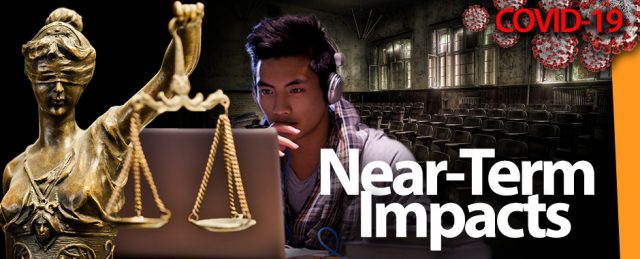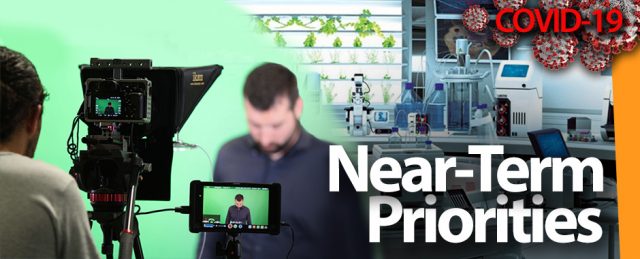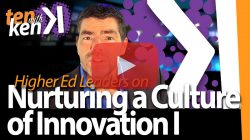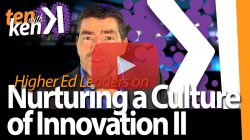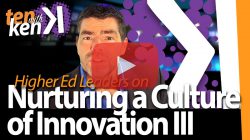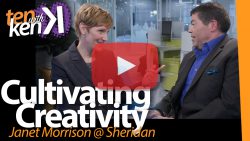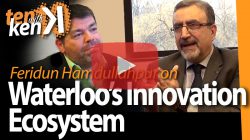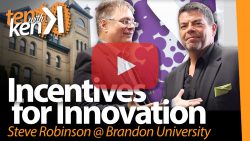Unleashing Innovation in Times of Anxiety
Encouraging Entrepreneurial Thinking on Campus
90-180 min keynote presentation or workshop
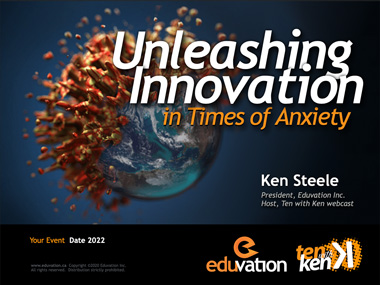 Centuries-old traditions of academic culture are in many ways responsible for the resiliency and long-term success of colleges and universities: collegial self-governance and peer review have steered disciplines and institutions away from dangerous and fleeting new ideas. The fundamental characteristics of traditional academics – perfectionist, circumspect, nuanced, meritocratic and risk-averse – have permeated virtually every campus, so that instructors, researchers, support staff and administrators alike tend to be inherently cautious and conservative. A community of sharp-witted independent thinkers can be merciless in their criticism of failed experiments, and many higher ed professionals learn to keep their heads down and avoid rocking the boat. All of these tendencies have been magnified in recent decades by constrained financial resources and increased demands for accountability and risk management.
Centuries-old traditions of academic culture are in many ways responsible for the resiliency and long-term success of colleges and universities: collegial self-governance and peer review have steered disciplines and institutions away from dangerous and fleeting new ideas. The fundamental characteristics of traditional academics – perfectionist, circumspect, nuanced, meritocratic and risk-averse – have permeated virtually every campus, so that instructors, researchers, support staff and administrators alike tend to be inherently cautious and conservative. A community of sharp-witted independent thinkers can be merciless in their criticism of failed experiments, and many higher ed professionals learn to keep their heads down and avoid rocking the boat. All of these tendencies have been magnified in recent decades by constrained financial resources and increased demands for accountability and risk management.
The sudden impact of the COVID19 pandemic on our society and economy has caused a tectonic shift in the ground beneath our institutions. Rapid and accelerating change has intensified. International recruitment has been upended. Innovative approaches to teaching and learning, student supports and campus life are placing new demands on staff and faculty. Now more than ever before, colleges and universities need to become more nimble, entrepreneurial and innovative in order to respond to a changing environment and competitive landscape, and to survive or even thrive in the years ahead.
It is necessary, but not sufficient, for a handful of senior administrators to possess an entrepreneurial, innovation mindset; colleges and universities must unlock the creativity and drive of staff, faculty and students across the entire campus for an innovation culture to be sustainable. Stakeholders at all levels need to be engaged in meaningful dialogue. Bright ideas need to be recognized, defended, and nurtured on the front lines. Diverse perspectives need to be brought to bear on challenges and opportunities, from under-represented and international voices, and external community and industry partners. Everyone on campus needs to contribute to, and learn to trust, an environment of openness, transparency, and entrepreneurial thinking. Financial incentives and resources may need realignment. Hiring and promotion criteria may need to be rethought. To promote an innovation mindset, campus leaders need to reduce the stigma of failure, and promote measured, informed risk-taking instead.
In this workshop, Ken will share some thought-provoking data, trends, insights and examples from the world’s most innovative colleges and universities, and guide participants as they consider the obstacles and opportunities to an innovation mindset on their campus. Participants should leave with some new perspective on their role in a campus-wide innovation culture, and some actionable ways in which they can contribute to a more nimble and entrepreneurial institution.
Ken Steele is Canada’s leading higher education monitor and futurist. He co-founded Academica Group, created the Academica Top Ten, manages Eduvation Inc, co-authored Canada’s first book on enrolment management, publishes a daily email newsbrief the Eduvation Insider, and hosts a weekly webcast, Ten with Ken, that reaches thousands of subscribers on a dozen platforms. Ken brings his unique perspective and insight to a broad range of audiences, from faculty and instructors, boards and senior administration, to information technology staff, concerned parents, and Canada’s most powerful corporate CEOs.
Ken has been blogging extensively on the COVID19 pandemic. Here are some relevant examples, for a sense of Ken’s approach and as potential pre-reading for participants:
Here are some relevant episodes of 10K, tackling the subject of campus innovation culture:
All contents copyright © 2014 Eduvation Inc. All rights reserved.



